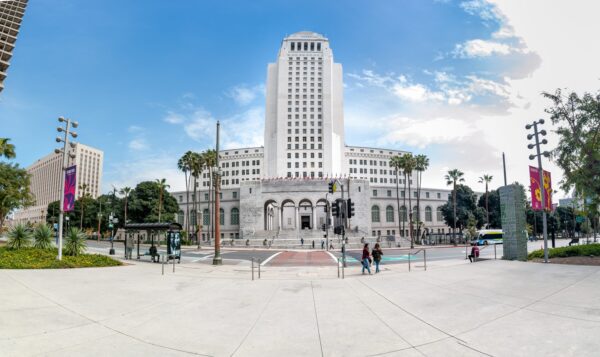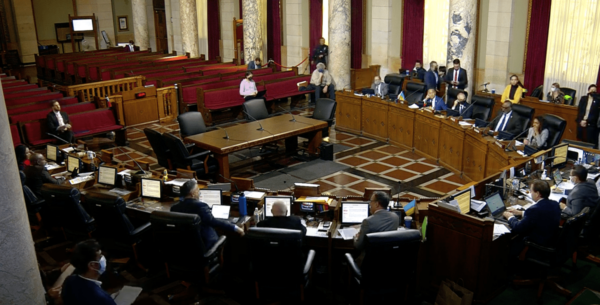By ERIC HE
Los Angeles’ state of local emergency due to COVID-19 will end in February, the City Council voted Wednesday.
The state of local emergency has been in place since March 4, 2020. The council has voted to extend it each month since then. Council President Paul Krekorian introduced an amendment to Wednesday’s item to continue the state of local emergency, but set an end date for Feb. 1, 2023.
Council members Marqueece Harris-Dawson, Mike Bonin and Nithya Raman voted against the end date, but the entire item passed 12-0. No council members offered comment before the vote.
California’s COVID-19 state of emergency is set to expire at the end of February.
The local state of emergency ensures that renter protections created during the pandemic remain in place, but the city’s long-standing eviction protections due to COVID-19 hardship are also set to expire at the end of January.
The vote comes as Los Angeles County is currently facing a surge in COVID-19 cases. The seven-day average daily rate of people testing positive for the virus was 13.5% as of Tuesday, up from 12.6% a week ago, and the number of new infections reported daily has been rising in recent weeks.
The county has already moved into the U.S. Centers for Disease Control and Prevention’s medium virus activity level, after weeks in the low category. The county could move into the high category as early as this week, if the weekly rate of new infections reaches 200 per 100,000 residents.
“We’re on the cusp of another winter surge and clearly the pandemic is not over,” Sasha Harnden, a public policy advocate with Inner City Law Center, told the council. “The council shouldn’t put an arbitrary end date on the emergency that we know is designed as a sneak attack on tenant protections.”
Mayor Eric Garcetti sent a notice to the council Wednesday recommending the end date, claiming that the city has “developed the infrastructure and capacity to manage the previous challenges of the COVID-19 pandemic in a way that they no longer rise to the level where they are beyond the control of the normal services, personnel, equipment and facilities of the regularly constituted branches and departments of the city government.”
“The circumstances and conditions that existed in 2020 and 2021 … have adjusted to a level currently manageable by the regularly constituted branches and departments of the city government,” Garcetti wrote.
This is Garcetti’s last week in office before Mayor-elect Karen Bass takes over on Monday.
Abby King, legislative affairs manager with the Valley Industry and Commerce Association, told the council that the virus is in a “fundamentally different place than in the spring of 2020.”
“Even with rising winter cases, our insight into the virus and improved public health response warrants a shift in the city’s emergency positioning,” King said. “There are many public policy items that remain trapped and tied to the emergency orders. It is no longer appropriate for the orders to continue with such negative and sweeping ramifications.”
Wednesday’s vote does not affect the council’s COVID-19 vaccine mandate for city employees, which was passed under a separate ordinance.
In October, the council voted 12-0 to approve a package of recommendations from a council committee to sunset the renters protections. Under the council action, landlords will be able to resume increasing rent on rent-controlled apartments, which account for three-quarters of the units in Los Angeles, beginning in February 2024.
Tenants who have missed payments since March 2020 will have to meet two repayment deadlines. Under state law, they have until Aug. 1, 2023, to pay back missed rent between March 1, 2020, and Sept. 30, 2021. Under the city’s moratorium, tenants will have until Feb. 1, 2024, to repay rent accumulated from Oct. 1, 2021 to Feb. 1, 2023.
The council in October expressed interest in exploring universal just-cause rules, which would require specific reasons for landlords to evict tenants in all units, not just those under rent control. It also supported providing relocation assistance for all evictions deemed no-fault evictions.
The council also voted 7-5 on Wednesday to end the state of emergency due to mpox — formally called monkeypox — and to allow meetings to take place remotely under the Brown Act due to COVID-19.
“It seems clear now that the findings necessary to support an emergency declaration are no longer the case, and that continuing to address the challenges of the mpox virus can be done with the normal governmental processes that are available to us,” Krekorian said.







